中考英语复习人教版冠词课件(共52张PPT)
文档属性
| 名称 | 中考英语复习人教版冠词课件(共52张PPT) |  | |
| 格式 | pptx | ||
| 文件大小 | 5.0MB | ||
| 资源类型 | 教案 | ||
| 版本资源 | 通用版 | ||
| 科目 | 英语 | ||
| 更新时间 | 2022-09-02 14:57:16 | ||
图片预览

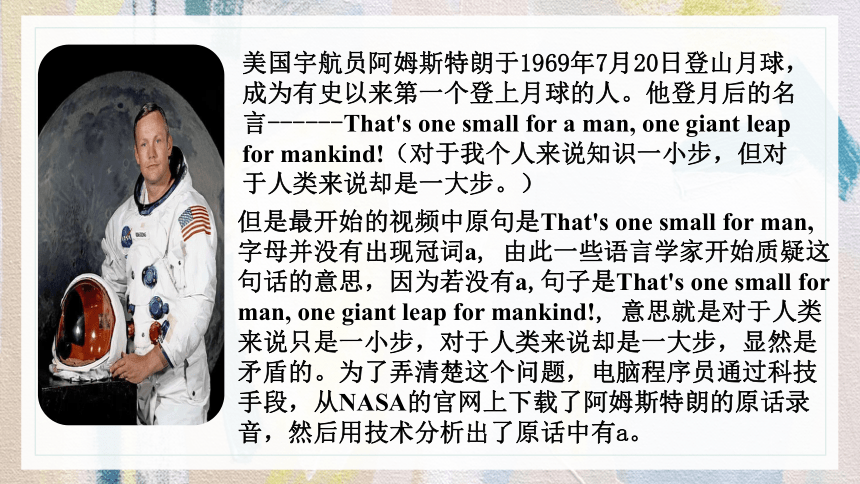
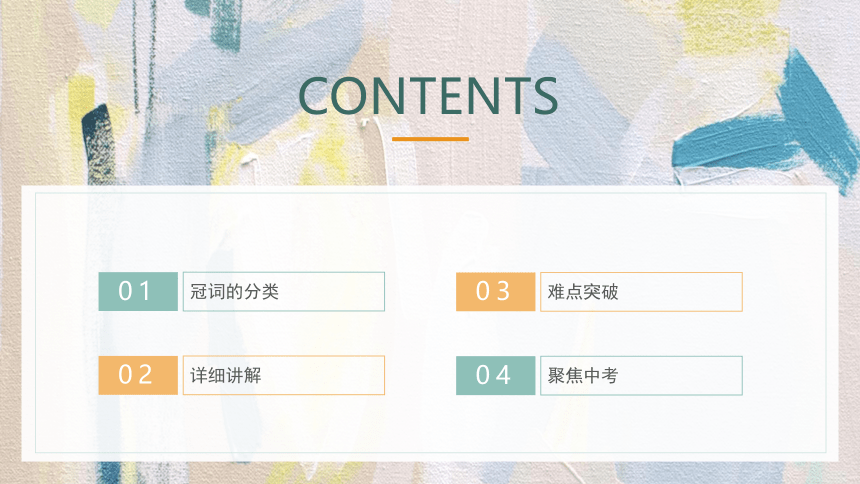

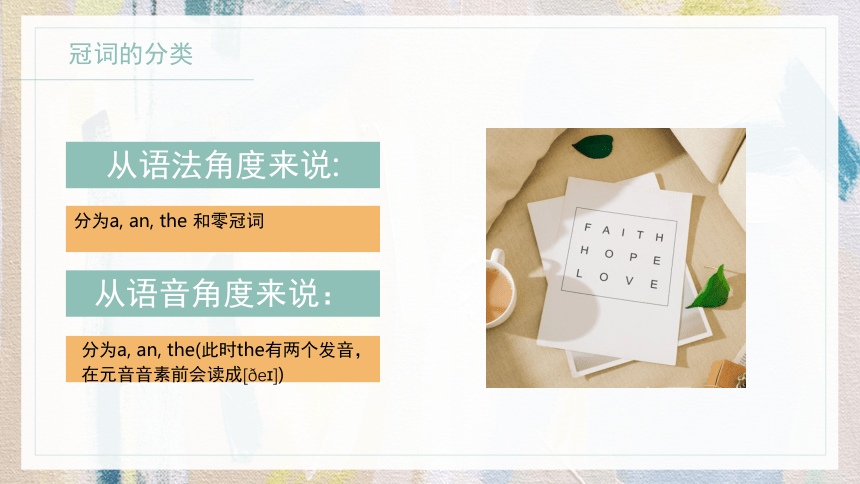
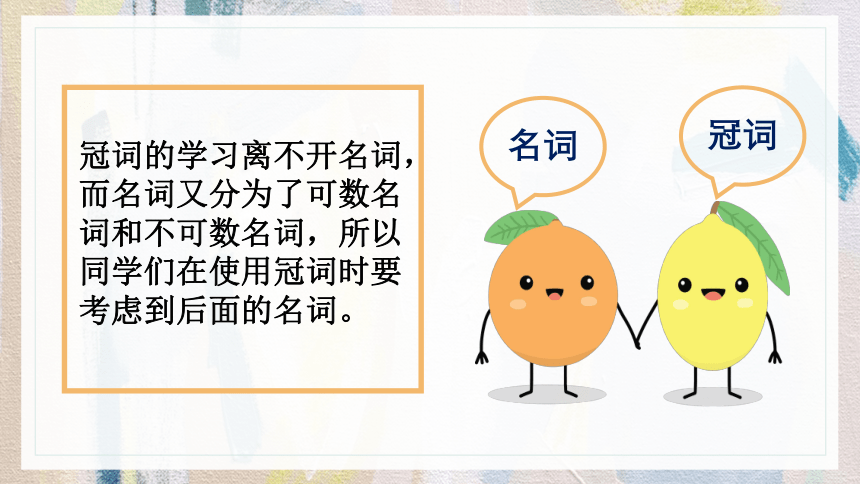

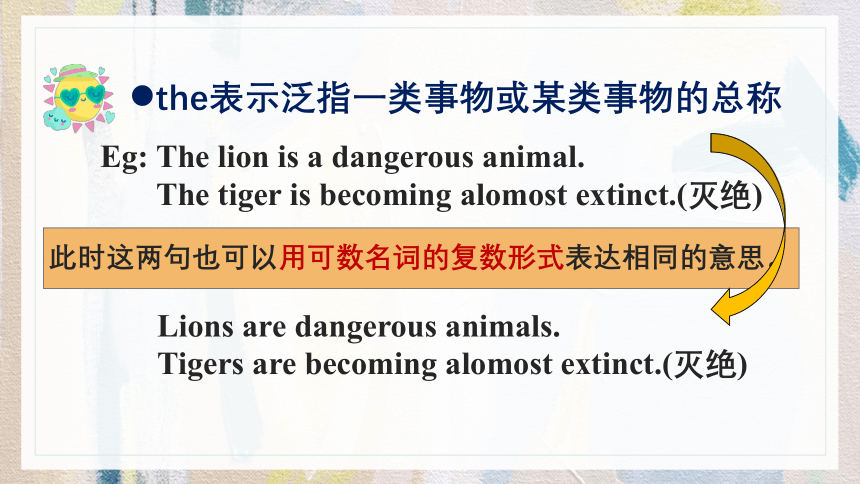
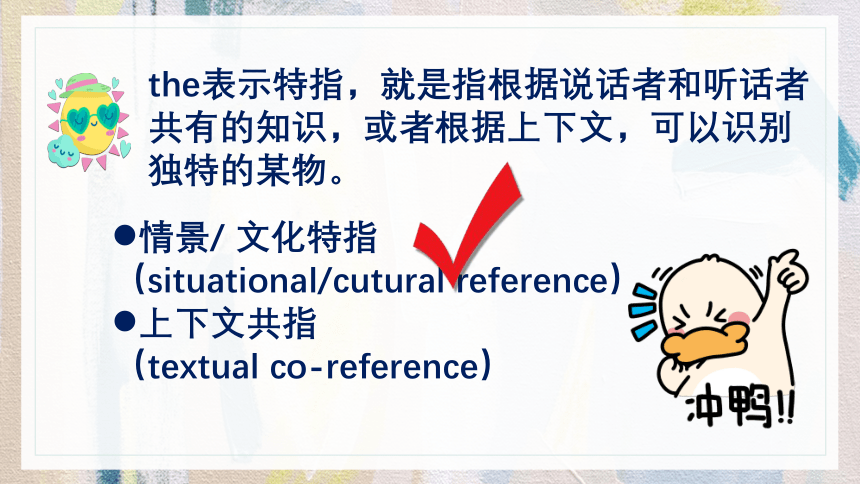
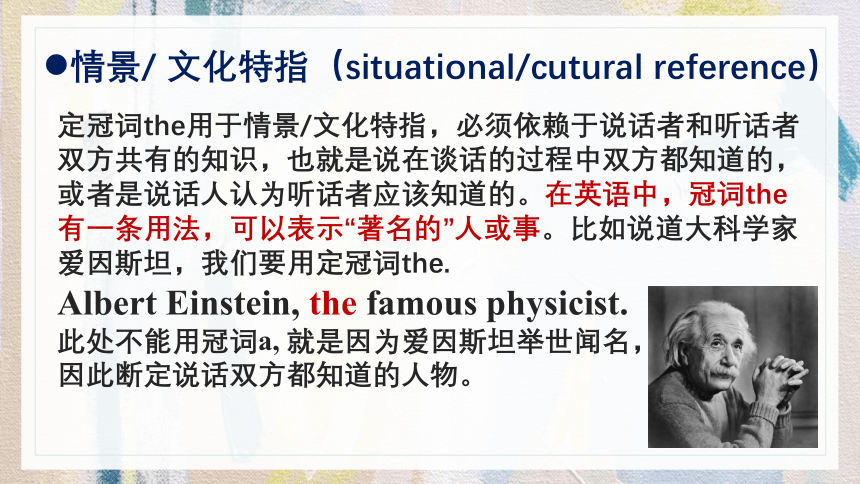
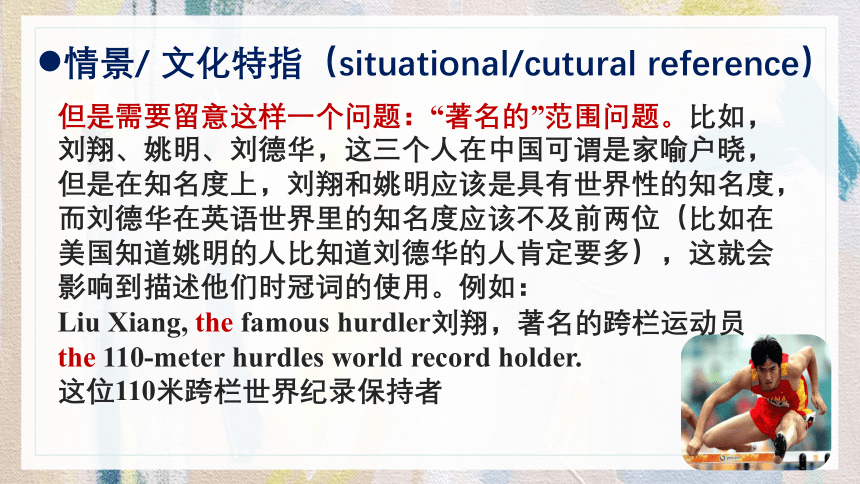
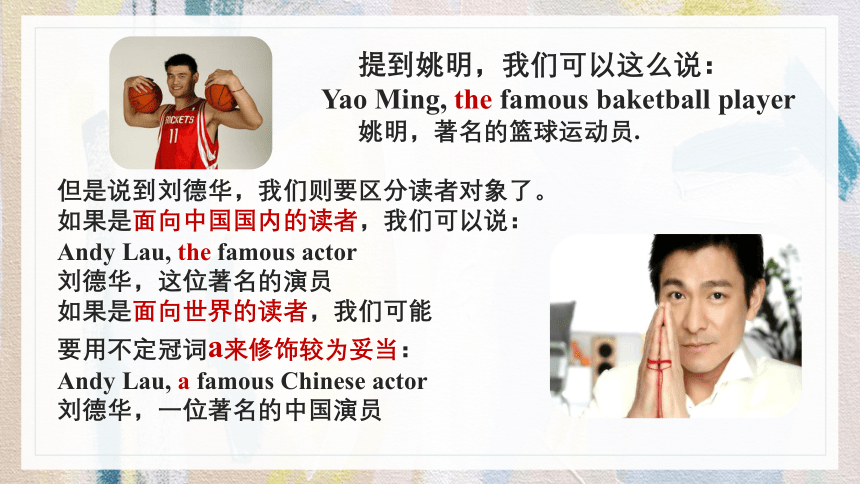
文档简介
(共52张PPT)
中考英语专题复习---冠词
美国宇航员阿姆斯特朗于1969年7月20日登山月球,成为有史以来第一个登上月球的人。他登月后的名言------That's one small for a man, one giant leap for mankind!(对于我个人来说知识一小步,但对于人类来说却是一大步。)
但是最开始的视频中原句是That's one small for man,字母并没有出现冠词a, 由此一些语言学家开始质疑这句话的意思,因为若没有a,句子是That's one small for man, one giant leap for mankind!, 意思就是对于人类来说只是一小步,对于人类来说却是一大步,显然是矛盾的。为了弄清楚这个问题,电脑程序员通过科技手段,从NASA的官网上下载了阿姆斯特朗的原话录音,然后用技术分析出了原话中有a。
CONTENTS
01
冠词的分类
02
详细讲解
03
难点突破
04
聚焦中考
冠词的分类
PART ONE
a/an/the
冠词的分类
从语法角度来说:
分为a, an, the 和零冠词
从语音角度来说:
分为a, an, the(此时the有两个发音,在元音音素前会读成[ e ])
名词
冠词
冠词的学习离不开名词,而名词又分为了可数名词和不可数名词,所以同学们在使用冠词时要考虑到后面的名词。
冠词的讲解
PART TWO
冠词the的用法
the表示泛指一类事物或某类事物的总称
Eg: The lion is a dangerous animal.
The tiger is becoming alomost extinct.(灭绝)
此时这两句也可以用可数名词的复数形式表达相同的意思。
Lions are dangerous animals.
Tigers are becoming alomost extinct.(灭绝)
the表示特指,就是指根据说话者和听话者
共有的知识,或者根据上下文,可以识别
独特的某物。
情景/ 文化特指
(situational/cutural reference)
上下文共指
(textual co-reference)
情景/ 文化特指(situational/cutural reference)
定冠词the用于情景/文化特指,必须依赖于说话者和听话者
双方共有的知识,也就是说在谈话的过程中双方都知道的,
或者是说话人认为听话者应该知道的。在英语中,冠词the
有一条用法,可以表示“著名的”人或事。比如说道大科学家
爱因斯坦,我们要用定冠词the.
Albert Einstein, the famous physicist.
此处不能用冠词a, 就是因为爱因斯坦举世闻名,
因此断定说话双方都知道的人物。
情景/ 文化特指(situational/cutural reference) reference)
但是需要留意这样一个问题:“著名的”范围问题。比如,
刘翔、姚明、刘德华,这三个人在中国可谓是家喻户晓,
但是在知名度上,刘翔和姚明应该是具有世界性的知名度,
而刘德华在英语世界里的知名度应该不及前两位(比如在
美国知道姚明的人比知道刘德华的人肯定要多),这就会
影响到描述他们时冠词的使用。例如:
Liu Xiang, the famous hurdler刘翔,著名的跨栏运动员
the 110-meter hurdles world record holder.
这位110米跨栏世界纪录保持者
提到姚明,我们可以这么说:
Yao Ming, the famous baketball player
姚明,著名的篮球运动员.
但是说到刘德华,我们则要区分读者对象了。
如果是面向中国国内的读者,我们可以说:
Andy Lau, the famous actor
刘德华,这位著名的演员
如果是面向世界的读者,我们可能
要用不定冠词a来修饰较为妥当:
Andy Lau, a famous Chinese actor
刘德华,一位著名的中国演员
情景/文化特指(situational/cutural reference)
TRY YOUR BEST
1.
2.
3.
一般常识(general knowledge)/
较大背景
具体知识(specific knowledge)/
局部情景(local use)
即时情景(immediate situation)
一般常识(general knowledge)
这里的一般常识紫的就是说话双方都知道的知识,也就是我们经常说的用语表示“世界上独一无二的事物”,比如下面的这些例子:
the North Pole北极
the Equator 赤道
the sun/moon/earth
the universe宇宙
the Renaissance 文艺复兴时期
the Pope罗马教皇
实际上,对于“一般知识”其实也有一个范围问题,这个范围从大的方面来说可以扩展到整个星球、整个人类知识领域,从小的方面来说可以局限于某一特定的地理范围或特定的知识领域。换句话说,较大的情景可以是世界性的(如the Pope),也可以是某一国家的民众都知道的,比如在美国,谈到the President时,几乎人人都知道他指的是谁。
一般常识(general knowledge)
具体知识(specific knowledge)/
局部情景(local use)
说话者与听话者共有的知识只是局限在一个特定的较小的范围内,比如对于同一个家庭或村庄的成员来说是独一无二的。比如在一个小镇上生活的人们,彼此之间谈到的the post office, the market, the hospital, 指的就是该镇上唯一的这些场所,或者是他们经常去的这些场所。
Eg: Let's go to the library.
Have you visited the castle
It was in the nespaper, so it must be true.
I missed both the lectures this morning.
即时情景用法(immediate situation)
在说话的时刻,所指为双方唯一看到或听到的。此时,冠词the的所指是从语言外的实景中推知的。请看例子:
The roses are very beautiful.
These are the cars.
Can you find the page
Shut the door, please!
Please look at the blackboard.
Don't open the windows.
Don't forget to finish the papers.
There is the book on the desk.
the表示特指,就是指根据说话者和听话者
共有的知识,或者根据上下文,可以识别
独特的某物。
情景/ 文化特指
(situational/cutural reference)
上下文共指
(textual co-reference)
上下文共指(textual co-reference)
上下文共指,就是指听话者和读者可以根据上下文找到的所指。它可分为前指和后指。前指又可以分成直接指和间接指。具体阐述如下:
直接前指
前面话语中已经提供的信息使后文中的某个名词短语特指某个事物,这即是前指。也就是我们常说的“第一次提到的单数可数名词前面要用不定冠词a或an, 再次出现的时候要用定冠词the”。请看例句:
上下文共指(textual co-reference)
I had a banana and an apple. I ate the banana and gave the apple to Mary.
Once upon a time, there was a little girl. The girl live with her mother and father.
A man came up to a policeman and asked him a question. The policeman didn't understand the question, so he asked the man to repeat it.
I did a grammar course last year. My friend is going to the course next year.
Bob lost a gold watch yesterday, and Bill was wearing the gold watch this morning.
There was once a cow who stole a wedge of cheese from a kitchen window. She flew off with the cheese to a nearby tree. A fox saw what the crow had done, and he walked over to the tree.
”Oh, Mistress Crow, you have such lovely black feathers, such slender feet, such a beautiful yellow beak, and such fine black eyes! You must have a beautiful voice. Would you please sing for me ''
The crow felt very proud. She opened her beak and sang, “CAW-CAW-CAW”. Of couse the cheese fell down and the fox snatched it up and ate every bite.
直接前指/话题与定冠词the
间接前指,表示所指的对象间接地称为听话者知识的一部分。这种知识是从已经谈到的事物中推断得到的。此时,在上文中往往会提到一个与下文有密切联系的概念或者话题,然后围绕这个话题展开讨论。例如:
John bought a bicycle, but when he rode it one of the wheels came off. (车轮子是属于bicycle的,所以要用the wheel)
I read a great novel last week. The imagery was fantastic.
(下文的the imagery与上文的novel的概念紧密相关)
I went to Shanghai last month. The traffic is awful.
(下文的traffic与上文的Shanghai密切相关)
后指/结构特指
后指,也叫结构特指(structural reference),往往出现在带有后置定语的名词短语中。一般来说,被某个后置定语所修饰的名词前要用定冠词the。例如:
The house on the corner is mine.
The students of the other team came from London.
I think he is the one who can help you.
In this special health report we look into the causes
and cures of your six most common health complaints.
(在这份专门的健康报告中,我们研究了你的六项最普遍的
疾病的发病原因和治疗方案。)
小试牛刀:在必要的地方添上the
1. _____ flowers in that vase are beautiful.
2. _____ flowers are beautiful.
3. _____ water consists of hydogen and oxygen.
4. I don't want to go swimming today. _____ water is too cold.
5. _____ health is more important than money.
6. Doctors are concerned with ____ health of their patients.
7. _____ gold is precious metal.
8. _____ gold in Mary's ring is 24 karats.
The
The
the
The
小试牛刀:在空格中填入适当的冠词
1. Yesterday I saw _____ dog and ____ cat. ____ dog was chasing ____
cat. ____ cat was chasing ____ mouse. ____ mouse ran into ____
hole, but ____ hole was very small. ____ cat couldn't get into ____
hole, so it ran up ____ tree. ____ dog tried to climb ____ tree too,
but it couldn't.
2. Yesterday I saw ____ man and ____ woman. They were having ____
argument. ____ man was yelling at (吼叫) ____ woman, and ____
woman was shouting at ____ man. I don't know what ____
argument was about.
a
a
The
the
The
a
The
a
the
The
the
a
The
the
a
a
an
The
the
the
the
the
冠词的讲解
PART TWO
冠词a/an的用法
a/an表示泛指(一般用在主语中)
a/an+单数可数名词可以表示泛指,强调的是某一类事物中任何一个具有代表性的成员,此时我们可以用any来替换a/an。比如:
1) A tiger is a dangerous animal.
2) The tiger is a dangerous animal.
3) Tigers are dangerous animals.
这三句话都表示“老虎是危险的动物。” 强调一个泛指的概念。
a/an表示泛指(一般用在主语中)
4) A teacher should be patient with his or her students.
这里的a teacher 相当于all teachers 或 any teacher, 表示泛指的概念。
5) A growing child needs great nourishment(营养).
这里的a growing child 相当于all growing children 或 any grwoing
child, 表示泛指的概念。
6) A child needs a plenty of love.
= Children need plenty of love.
= Any child needs plenty of love.
7) The best way to learn a language is to live among its speakers.
8) A dog makes a good pet.
a/an表示泛指---用在补足语中,表示分类,
具有描述功能
在英语中,单数可数名词在作表语时,通常需要一个冠词。
如果用不定冠词a/an,则具有描述的功能,而没有所指功能。例如:
Bill is an engineer. (不能说Bill is engineer.) Bill 是一名工程师。
Bill is the engineer. 这里的the engineer不是强调比尔的“工程师”身份,而是强调比尔是完成某项工作的工程师。比如后边接下文说:
Bill is the engineer who will design the bridge.
比尔是设计这座桥的工程师。
This is a warm day. 这是一个暖和的日子。
This is a banana. That is an apple. 这是一个香蕉。那是一个苹果。
John is a teacher. 约翰是个老师。
注意:若这里的人或事物的身份是独一无二的,要用定冠词the, 或者常常省去冠词。例如:
1) They appointed him Head Librarian.他们任命他为图书馆长。
2) He is a librarian. 他是个图书管理员。
在1)句中,Head Librarian是表示“图书馆长”,这个职位对于一个图书馆来说是唯一的,所以此处没有用冠词a来修饰。在2)中,librarian表示“图书管理员”,这个职位一般来说不是唯一的,所以此处用不定冠词a来修饰。
要注意这些表示独一无二的身份或者职务的名称在句中出现的位置,它们通常是出现在补足语的位置,如果出现在宾语或者主语位置,则需要加上the。
He was elected President in 1879. (主语补足语)
I want to see the President. (宾语的位置)
Queen Eilzabeth had dinner with President Kenndy. (表头衔,作同位语)
The Queen had dinner with the President. (主语和宾语的位置)
a/an表示泛指---用在宾语中,具有所指功能
Speaker Listener Specific Nonspecific
Specific 情形一:对话者与听话者都是定指 (speker---specific, listener---specific) Eg: How did I do on the test 情形二:对话者不是指定,对听话者是指定(speker---nonspecific,
listener---specific)
Eg: Don't you have a tutor
Nonspecific 情形三:对话者是指定,听话者不是定指 (speker---specific, listener---nonspecific) Eg: Mary dose have a small Toyota. 情形四:对话者与听话者都不是定指
(speker---nonspecific, listener---nonspecific)
Eg: I don't have a car.
Student: How did I do on the test
Teacher: Well, actually you didn't do very well. Don't you have a tutor
Student: Yes, Mary's been tutoring me for two weeks now. It's been difficult to me though, because
I don't have a car. Mary does have a small Toyota, but it isn't always reliable.
不定冠词a/an与不可数名词
我们在前文讲过,在三类名词(单数名词、复数名词和不可数名词)
当中,不定冠词仅用于限定可数名词单数。但是,处于特定的意义,
我们表达时还是需要用a/an来限定不可数名词。例如:
A washing powder I've found to extremely good is “Snow”.
我发现了一种极好的洗衣粉,牌子是“雪花”牌。
This seems to be an excellent oil; the engine's running very smoothy.
看起来是一种极好的油,发动机运转得很平稳。
一、很多不可数名词与a/an连用,表示“一种”或“一类”。
Eg: A cheese that I like is Camembert.
我喜欢的一种奶酪是卡芒贝尔产的一款。
二、对于饮料类的不可数名词,与a/an连用时,表示“一杯”。
Eg: I'd like a beer, please. 我想要一杯啤酒。
三、有些不可数名词,当它们与a/an连用时,意思会发生改变。
Eg: glass 玻璃------ a glass 一个玻璃杯
iron 铁 ------ an iron 电熨斗
art 艺术 ------ an art 技术
beauty 美丽------ a beauty 美人
youth 青春 ------ a youth 一个年轻人
cloth 布 ------ a cloth 抹布
不定冠词a/an与不可数名词
小试牛刀:在必要的地方填上适当的冠词
1. When you're in town, can you get ___ paper The printer has run out.
2. When you're in town, can you get ___ paper I want to get the football
result.
3. I've spilt (撒) some wine; get ___ cloth.
4. ___cloth has to be imported(进口). That's why clothes are expensive.
5. After walking for about an hour we came to ___ wood.
6. If you want to make a fire, you'll need ____ wood.
7. Is there ___ chicken in this hamburger It tastes as if there is.
8. I ran over ___ chicken near a farm today.
a
纸,不可数名词
一张报纸
a
一块抹布
布料
a
一片树林
木材
鸡肉
一只鸡
a
冠词的讲解
PART TWO
零冠词的用法
零冠词的用法------不用冠词
在表示国名、地名、人名等专有名词前
Eg: Beijing is my favourite place in the whole world.
Blue Moon is good, but Miller’s the best in town.
名词前已有作定语的指示代词、物主代词、不定代词或名词所有格
Eg: There will be another meeting later this week.
I’m sure you don’t want to listen to all my prolems.
不可数名词和复数名词表示一类人或者物时
Eg: Rice is the main crop grown in the area.
Every week they get together to make music.
零冠词的用法------不用冠词
在星期、月份或节日前
Eg: It was raining on Monday.
The theater opened in May.
在称呼或表示头衔的名词前
Eg: Uncle Wang is going to mend my bike.
在三餐、球类运动和学科名词前
Eg: We had supper in a small Italian place.
Tim is good at math and science.
零冠词的用法------不用冠词
在与by连用的交通工具名词前
Eg: Do you go by bus or by train
She goes to school by bike.
在某些固定的词组中的名词前
day and night 日日夜夜 at night 在夜晚 at noon 在中午
at home 在家 at work 在上班 at dinner 在用餐
at breakfast 早餐时 after school 放学后 by hand 手工
by mistake 错误地 on foot 步行 in surprise 惊讶
真题链接
1. We usually go swimming in _____ summer. But in _____ summer of 2018, we didn’t.
A. / ; / B. a ; a C. / ; the D. a ; /
2. If you want to take _____ short ride in the city, choose _____ shared bike.
A. a ; / B. the ; the C. a ; a D. / ; a
3. Mike ofte plays ____ football on weekends.
A. a B. an C. / D. the
4. Beijing is _____ capital of China; it has _____ long history.
A. the ; an B. a ; a C. the ; a D. a ; /
5. We often have three meals _____ day. They have ____ dinner at 6:30 pm every day.
A. a ; a B. a ; the C. / ; a D. a ; /
难点突破
PART THREE
用/不用冠词的意义区别
用/不用冠词的意义区别
在英语中,有一类表示家居生活和社会事业机构的名词,在有冠词
修饰和无冠词修饰两种不同的情况,意思往往也不一样,请看例句:
Eg: His mother is in hospital and he has been in the hospital to take care of her.
(他妈妈生病住院了,他就一直在医院里照顾她。)
Eg: 1) He is in prison for bribery. (他因贿赂而入狱。)
2) He is often invited to the prison to give lectures.(他常被邀请去监狱做演讲。)
家居生活类名词
at table 进餐、吃饭
at the table 在餐桌旁
go to bed 上床睡觉
go to the bed 到床边
go to bed 上床睡觉
lie down on the bed 躺在床上
in bed 在睡觉
in the bed 窝在床上
处所、建筑物或社会事业机构等
in hospital 住院
in the hospital 在医院里
come out of hospital 出院
come out of the hospital 从医院出来
be in/at church做礼拜
go to the church 去教堂
go to school 上学
go to the school 去学校
in school 在校念书
in the school 在学校里
in class 在上课
in the class 在这个班级
in office 在职;上台执政
in the office 在办公室里
out of office 离职;下台
out of the office 离开办公室
高频考点
in front of 在......(外部)的前面
in the front of 在......(内部)的前面
I'm in the classroom.
The tree is in front of the classroom, and John is in the front of the classroom. So he can't see the tree.
其他使用冠词的场合
一、形容词或副词最高级、序数词以及only用作形容词加名词连用时,要
在前面加the;
Eg: the only/best way to solve the problem
This is the first time I've come to Beijing.
二、在乐器、乐团、合唱团和音乐团体前加the;
Eg: the Beats 甲壳虫乐队
play the piano/guitar 弹琴/吉他
三、定冠词the与姓氏连用表示一家人;
Eg: the Smiths 史密斯夫妇/史密斯一家人
聚焦中考
PART FOUR
Practice makes perfect
小试牛刀:在必要的地方填上适当的冠词
1. A:I have _____ idea. Let's go on _____ picnic Saturday.
B: Sounds great!
2. A: Did you have fun at ______ picnic yesterday
B: Sure I did.
3. A: Where is my blue shirt
B: It's in ____ washing machine. You'll have to
wear _____ different shirt.
an
a
the
the
a
小试牛刀:在必要的地方填上适当的冠词
4. I hope I have _____ washing machine.
5. Everyone has _____ problems in ____ life.
6. My grandfather has _____ long life.
7. That book is about ______ life of Helen Keller.
8. I'll meet you at _____ university at three o'clock, outside ____
room 26.
9. _____ dog needs to go to _____ vet. Can you take him
10. When I got up, I noticed _____ car windscreen was covered in ____
ice.
a
a
the
the
The
the
the
真题链接
1. A: Is that ____ post office B: No, it’s ____ old library.
A. the ; a B. a ; an C. an ; a D. an ; the
2. Hide-and-seek is ____ interesting game for children.
A. a B. an C. the D. /
3. ___ Great Wall is one of the seven wonders around the world.
A. The B. A C. An D. /
4. --- ___ Smiths are used to living in Shanghai now.
--- We hope more and more foreign friedns live ___ better life in China.
A. / ; a B. The ; an C. The ; a D. / ; the
真题链接
6. Chinese learning is popular with people all over ____ world.
A. a B. an C. / D. the
7. Our English teacher told us ___ interesting story and ____ was about Thomas
Edison.
A. an ; a B. the ; the C. a ; the D. an ; the
8. Sandy is ___ Australian girl. She came to China for travelling with her parents
last week.
A. the B. a C. an D. /
9. --- I am going to have ___ picnic on ___ Sunday.
A. / ; a B. a ; an C. a ; the D. a ; /
仿真
I was born in a small town in ____ southwestern part of Korea. I have lots of
memories there. One of them is taking the geese from my ___ home to the river
with my brother.
At ___ first, it was difficult for us to take ___ geese out, and take them to the river. To keep them together, we had to use sticks. On ___ way to the river, however, they found food on the road or saw other animals such as chickens, dogs, or other geese.
Our geese didn’t see any of these things before. All ___ geese looked very excited on seeing these new things. They seemed to try to tell each other about their new trip.
the
/
/
the
the
the
仿真
When the geese reached ___ river, they kept jumping down and enjoying taking ___ bath and eating food. My brother and I were very happy because we set ___ animals free.
While they were playing in the river, my brother and I sat on the bank and played with ___ glass ball. All these wonderful memories with the geese still give me lots of joy.
the
a
the
a
感谢您的聆听与指导
Thank you for your listening.
中考英语专题复习---冠词
美国宇航员阿姆斯特朗于1969年7月20日登山月球,成为有史以来第一个登上月球的人。他登月后的名言------That's one small for a man, one giant leap for mankind!(对于我个人来说知识一小步,但对于人类来说却是一大步。)
但是最开始的视频中原句是That's one small for man,字母并没有出现冠词a, 由此一些语言学家开始质疑这句话的意思,因为若没有a,句子是That's one small for man, one giant leap for mankind!, 意思就是对于人类来说只是一小步,对于人类来说却是一大步,显然是矛盾的。为了弄清楚这个问题,电脑程序员通过科技手段,从NASA的官网上下载了阿姆斯特朗的原话录音,然后用技术分析出了原话中有a。
CONTENTS
01
冠词的分类
02
详细讲解
03
难点突破
04
聚焦中考
冠词的分类
PART ONE
a/an/the
冠词的分类
从语法角度来说:
分为a, an, the 和零冠词
从语音角度来说:
分为a, an, the(此时the有两个发音,在元音音素前会读成[ e ])
名词
冠词
冠词的学习离不开名词,而名词又分为了可数名词和不可数名词,所以同学们在使用冠词时要考虑到后面的名词。
冠词的讲解
PART TWO
冠词the的用法
the表示泛指一类事物或某类事物的总称
Eg: The lion is a dangerous animal.
The tiger is becoming alomost extinct.(灭绝)
此时这两句也可以用可数名词的复数形式表达相同的意思。
Lions are dangerous animals.
Tigers are becoming alomost extinct.(灭绝)
the表示特指,就是指根据说话者和听话者
共有的知识,或者根据上下文,可以识别
独特的某物。
情景/ 文化特指
(situational/cutural reference)
上下文共指
(textual co-reference)
情景/ 文化特指(situational/cutural reference)
定冠词the用于情景/文化特指,必须依赖于说话者和听话者
双方共有的知识,也就是说在谈话的过程中双方都知道的,
或者是说话人认为听话者应该知道的。在英语中,冠词the
有一条用法,可以表示“著名的”人或事。比如说道大科学家
爱因斯坦,我们要用定冠词the.
Albert Einstein, the famous physicist.
此处不能用冠词a, 就是因为爱因斯坦举世闻名,
因此断定说话双方都知道的人物。
情景/ 文化特指(situational/cutural reference) reference)
但是需要留意这样一个问题:“著名的”范围问题。比如,
刘翔、姚明、刘德华,这三个人在中国可谓是家喻户晓,
但是在知名度上,刘翔和姚明应该是具有世界性的知名度,
而刘德华在英语世界里的知名度应该不及前两位(比如在
美国知道姚明的人比知道刘德华的人肯定要多),这就会
影响到描述他们时冠词的使用。例如:
Liu Xiang, the famous hurdler刘翔,著名的跨栏运动员
the 110-meter hurdles world record holder.
这位110米跨栏世界纪录保持者
提到姚明,我们可以这么说:
Yao Ming, the famous baketball player
姚明,著名的篮球运动员.
但是说到刘德华,我们则要区分读者对象了。
如果是面向中国国内的读者,我们可以说:
Andy Lau, the famous actor
刘德华,这位著名的演员
如果是面向世界的读者,我们可能
要用不定冠词a来修饰较为妥当:
Andy Lau, a famous Chinese actor
刘德华,一位著名的中国演员
情景/文化特指(situational/cutural reference)
TRY YOUR BEST
1.
2.
3.
一般常识(general knowledge)/
较大背景
具体知识(specific knowledge)/
局部情景(local use)
即时情景(immediate situation)
一般常识(general knowledge)
这里的一般常识紫的就是说话双方都知道的知识,也就是我们经常说的用语表示“世界上独一无二的事物”,比如下面的这些例子:
the North Pole北极
the Equator 赤道
the sun/moon/earth
the universe宇宙
the Renaissance 文艺复兴时期
the Pope罗马教皇
实际上,对于“一般知识”其实也有一个范围问题,这个范围从大的方面来说可以扩展到整个星球、整个人类知识领域,从小的方面来说可以局限于某一特定的地理范围或特定的知识领域。换句话说,较大的情景可以是世界性的(如the Pope),也可以是某一国家的民众都知道的,比如在美国,谈到the President时,几乎人人都知道他指的是谁。
一般常识(general knowledge)
具体知识(specific knowledge)/
局部情景(local use)
说话者与听话者共有的知识只是局限在一个特定的较小的范围内,比如对于同一个家庭或村庄的成员来说是独一无二的。比如在一个小镇上生活的人们,彼此之间谈到的the post office, the market, the hospital, 指的就是该镇上唯一的这些场所,或者是他们经常去的这些场所。
Eg: Let's go to the library.
Have you visited the castle
It was in the nespaper, so it must be true.
I missed both the lectures this morning.
即时情景用法(immediate situation)
在说话的时刻,所指为双方唯一看到或听到的。此时,冠词the的所指是从语言外的实景中推知的。请看例子:
The roses are very beautiful.
These are the cars.
Can you find the page
Shut the door, please!
Please look at the blackboard.
Don't open the windows.
Don't forget to finish the papers.
There is the book on the desk.
the表示特指,就是指根据说话者和听话者
共有的知识,或者根据上下文,可以识别
独特的某物。
情景/ 文化特指
(situational/cutural reference)
上下文共指
(textual co-reference)
上下文共指(textual co-reference)
上下文共指,就是指听话者和读者可以根据上下文找到的所指。它可分为前指和后指。前指又可以分成直接指和间接指。具体阐述如下:
直接前指
前面话语中已经提供的信息使后文中的某个名词短语特指某个事物,这即是前指。也就是我们常说的“第一次提到的单数可数名词前面要用不定冠词a或an, 再次出现的时候要用定冠词the”。请看例句:
上下文共指(textual co-reference)
I had a banana and an apple. I ate the banana and gave the apple to Mary.
Once upon a time, there was a little girl. The girl live with her mother and father.
A man came up to a policeman and asked him a question. The policeman didn't understand the question, so he asked the man to repeat it.
I did a grammar course last year. My friend is going to the course next year.
Bob lost a gold watch yesterday, and Bill was wearing the gold watch this morning.
There was once a cow who stole a wedge of cheese from a kitchen window. She flew off with the cheese to a nearby tree. A fox saw what the crow had done, and he walked over to the tree.
”Oh, Mistress Crow, you have such lovely black feathers, such slender feet, such a beautiful yellow beak, and such fine black eyes! You must have a beautiful voice. Would you please sing for me ''
The crow felt very proud. She opened her beak and sang, “CAW-CAW-CAW”. Of couse the cheese fell down and the fox snatched it up and ate every bite.
直接前指/话题与定冠词the
间接前指,表示所指的对象间接地称为听话者知识的一部分。这种知识是从已经谈到的事物中推断得到的。此时,在上文中往往会提到一个与下文有密切联系的概念或者话题,然后围绕这个话题展开讨论。例如:
John bought a bicycle, but when he rode it one of the wheels came off. (车轮子是属于bicycle的,所以要用the wheel)
I read a great novel last week. The imagery was fantastic.
(下文的the imagery与上文的novel的概念紧密相关)
I went to Shanghai last month. The traffic is awful.
(下文的traffic与上文的Shanghai密切相关)
后指/结构特指
后指,也叫结构特指(structural reference),往往出现在带有后置定语的名词短语中。一般来说,被某个后置定语所修饰的名词前要用定冠词the。例如:
The house on the corner is mine.
The students of the other team came from London.
I think he is the one who can help you.
In this special health report we look into the causes
and cures of your six most common health complaints.
(在这份专门的健康报告中,我们研究了你的六项最普遍的
疾病的发病原因和治疗方案。)
小试牛刀:在必要的地方添上the
1. _____ flowers in that vase are beautiful.
2. _____ flowers are beautiful.
3. _____ water consists of hydogen and oxygen.
4. I don't want to go swimming today. _____ water is too cold.
5. _____ health is more important than money.
6. Doctors are concerned with ____ health of their patients.
7. _____ gold is precious metal.
8. _____ gold in Mary's ring is 24 karats.
The
The
the
The
小试牛刀:在空格中填入适当的冠词
1. Yesterday I saw _____ dog and ____ cat. ____ dog was chasing ____
cat. ____ cat was chasing ____ mouse. ____ mouse ran into ____
hole, but ____ hole was very small. ____ cat couldn't get into ____
hole, so it ran up ____ tree. ____ dog tried to climb ____ tree too,
but it couldn't.
2. Yesterday I saw ____ man and ____ woman. They were having ____
argument. ____ man was yelling at (吼叫) ____ woman, and ____
woman was shouting at ____ man. I don't know what ____
argument was about.
a
a
The
the
The
a
The
a
the
The
the
a
The
the
a
a
an
The
the
the
the
the
冠词的讲解
PART TWO
冠词a/an的用法
a/an表示泛指(一般用在主语中)
a/an+单数可数名词可以表示泛指,强调的是某一类事物中任何一个具有代表性的成员,此时我们可以用any来替换a/an。比如:
1) A tiger is a dangerous animal.
2) The tiger is a dangerous animal.
3) Tigers are dangerous animals.
这三句话都表示“老虎是危险的动物。” 强调一个泛指的概念。
a/an表示泛指(一般用在主语中)
4) A teacher should be patient with his or her students.
这里的a teacher 相当于all teachers 或 any teacher, 表示泛指的概念。
5) A growing child needs great nourishment(营养).
这里的a growing child 相当于all growing children 或 any grwoing
child, 表示泛指的概念。
6) A child needs a plenty of love.
= Children need plenty of love.
= Any child needs plenty of love.
7) The best way to learn a language is to live among its speakers.
8) A dog makes a good pet.
a/an表示泛指---用在补足语中,表示分类,
具有描述功能
在英语中,单数可数名词在作表语时,通常需要一个冠词。
如果用不定冠词a/an,则具有描述的功能,而没有所指功能。例如:
Bill is an engineer. (不能说Bill is engineer.) Bill 是一名工程师。
Bill is the engineer. 这里的the engineer不是强调比尔的“工程师”身份,而是强调比尔是完成某项工作的工程师。比如后边接下文说:
Bill is the engineer who will design the bridge.
比尔是设计这座桥的工程师。
This is a warm day. 这是一个暖和的日子。
This is a banana. That is an apple. 这是一个香蕉。那是一个苹果。
John is a teacher. 约翰是个老师。
注意:若这里的人或事物的身份是独一无二的,要用定冠词the, 或者常常省去冠词。例如:
1) They appointed him Head Librarian.他们任命他为图书馆长。
2) He is a librarian. 他是个图书管理员。
在1)句中,Head Librarian是表示“图书馆长”,这个职位对于一个图书馆来说是唯一的,所以此处没有用冠词a来修饰。在2)中,librarian表示“图书管理员”,这个职位一般来说不是唯一的,所以此处用不定冠词a来修饰。
要注意这些表示独一无二的身份或者职务的名称在句中出现的位置,它们通常是出现在补足语的位置,如果出现在宾语或者主语位置,则需要加上the。
He was elected President in 1879. (主语补足语)
I want to see the President. (宾语的位置)
Queen Eilzabeth had dinner with President Kenndy. (表头衔,作同位语)
The Queen had dinner with the President. (主语和宾语的位置)
a/an表示泛指---用在宾语中,具有所指功能
Speaker Listener Specific Nonspecific
Specific 情形一:对话者与听话者都是定指 (speker---specific, listener---specific) Eg: How did I do on the test 情形二:对话者不是指定,对听话者是指定(speker---nonspecific,
listener---specific)
Eg: Don't you have a tutor
Nonspecific 情形三:对话者是指定,听话者不是定指 (speker---specific, listener---nonspecific) Eg: Mary dose have a small Toyota. 情形四:对话者与听话者都不是定指
(speker---nonspecific, listener---nonspecific)
Eg: I don't have a car.
Student: How did I do on the test
Teacher: Well, actually you didn't do very well. Don't you have a tutor
Student: Yes, Mary's been tutoring me for two weeks now. It's been difficult to me though, because
I don't have a car. Mary does have a small Toyota, but it isn't always reliable.
不定冠词a/an与不可数名词
我们在前文讲过,在三类名词(单数名词、复数名词和不可数名词)
当中,不定冠词仅用于限定可数名词单数。但是,处于特定的意义,
我们表达时还是需要用a/an来限定不可数名词。例如:
A washing powder I've found to extremely good is “Snow”.
我发现了一种极好的洗衣粉,牌子是“雪花”牌。
This seems to be an excellent oil; the engine's running very smoothy.
看起来是一种极好的油,发动机运转得很平稳。
一、很多不可数名词与a/an连用,表示“一种”或“一类”。
Eg: A cheese that I like is Camembert.
我喜欢的一种奶酪是卡芒贝尔产的一款。
二、对于饮料类的不可数名词,与a/an连用时,表示“一杯”。
Eg: I'd like a beer, please. 我想要一杯啤酒。
三、有些不可数名词,当它们与a/an连用时,意思会发生改变。
Eg: glass 玻璃------ a glass 一个玻璃杯
iron 铁 ------ an iron 电熨斗
art 艺术 ------ an art 技术
beauty 美丽------ a beauty 美人
youth 青春 ------ a youth 一个年轻人
cloth 布 ------ a cloth 抹布
不定冠词a/an与不可数名词
小试牛刀:在必要的地方填上适当的冠词
1. When you're in town, can you get ___ paper The printer has run out.
2. When you're in town, can you get ___ paper I want to get the football
result.
3. I've spilt (撒) some wine; get ___ cloth.
4. ___cloth has to be imported(进口). That's why clothes are expensive.
5. After walking for about an hour we came to ___ wood.
6. If you want to make a fire, you'll need ____ wood.
7. Is there ___ chicken in this hamburger It tastes as if there is.
8. I ran over ___ chicken near a farm today.
a
纸,不可数名词
一张报纸
a
一块抹布
布料
a
一片树林
木材
鸡肉
一只鸡
a
冠词的讲解
PART TWO
零冠词的用法
零冠词的用法------不用冠词
在表示国名、地名、人名等专有名词前
Eg: Beijing is my favourite place in the whole world.
Blue Moon is good, but Miller’s the best in town.
名词前已有作定语的指示代词、物主代词、不定代词或名词所有格
Eg: There will be another meeting later this week.
I’m sure you don’t want to listen to all my prolems.
不可数名词和复数名词表示一类人或者物时
Eg: Rice is the main crop grown in the area.
Every week they get together to make music.
零冠词的用法------不用冠词
在星期、月份或节日前
Eg: It was raining on Monday.
The theater opened in May.
在称呼或表示头衔的名词前
Eg: Uncle Wang is going to mend my bike.
在三餐、球类运动和学科名词前
Eg: We had supper in a small Italian place.
Tim is good at math and science.
零冠词的用法------不用冠词
在与by连用的交通工具名词前
Eg: Do you go by bus or by train
She goes to school by bike.
在某些固定的词组中的名词前
day and night 日日夜夜 at night 在夜晚 at noon 在中午
at home 在家 at work 在上班 at dinner 在用餐
at breakfast 早餐时 after school 放学后 by hand 手工
by mistake 错误地 on foot 步行 in surprise 惊讶
真题链接
1. We usually go swimming in _____ summer. But in _____ summer of 2018, we didn’t.
A. / ; / B. a ; a C. / ; the D. a ; /
2. If you want to take _____ short ride in the city, choose _____ shared bike.
A. a ; / B. the ; the C. a ; a D. / ; a
3. Mike ofte plays ____ football on weekends.
A. a B. an C. / D. the
4. Beijing is _____ capital of China; it has _____ long history.
A. the ; an B. a ; a C. the ; a D. a ; /
5. We often have three meals _____ day. They have ____ dinner at 6:30 pm every day.
A. a ; a B. a ; the C. / ; a D. a ; /
难点突破
PART THREE
用/不用冠词的意义区别
用/不用冠词的意义区别
在英语中,有一类表示家居生活和社会事业机构的名词,在有冠词
修饰和无冠词修饰两种不同的情况,意思往往也不一样,请看例句:
Eg: His mother is in hospital and he has been in the hospital to take care of her.
(他妈妈生病住院了,他就一直在医院里照顾她。)
Eg: 1) He is in prison for bribery. (他因贿赂而入狱。)
2) He is often invited to the prison to give lectures.(他常被邀请去监狱做演讲。)
家居生活类名词
at table 进餐、吃饭
at the table 在餐桌旁
go to bed 上床睡觉
go to the bed 到床边
go to bed 上床睡觉
lie down on the bed 躺在床上
in bed 在睡觉
in the bed 窝在床上
处所、建筑物或社会事业机构等
in hospital 住院
in the hospital 在医院里
come out of hospital 出院
come out of the hospital 从医院出来
be in/at church做礼拜
go to the church 去教堂
go to school 上学
go to the school 去学校
in school 在校念书
in the school 在学校里
in class 在上课
in the class 在这个班级
in office 在职;上台执政
in the office 在办公室里
out of office 离职;下台
out of the office 离开办公室
高频考点
in front of 在......(外部)的前面
in the front of 在......(内部)的前面
I'm in the classroom.
The tree is in front of the classroom, and John is in the front of the classroom. So he can't see the tree.
其他使用冠词的场合
一、形容词或副词最高级、序数词以及only用作形容词加名词连用时,要
在前面加the;
Eg: the only/best way to solve the problem
This is the first time I've come to Beijing.
二、在乐器、乐团、合唱团和音乐团体前加the;
Eg: the Beats 甲壳虫乐队
play the piano/guitar 弹琴/吉他
三、定冠词the与姓氏连用表示一家人;
Eg: the Smiths 史密斯夫妇/史密斯一家人
聚焦中考
PART FOUR
Practice makes perfect
小试牛刀:在必要的地方填上适当的冠词
1. A:I have _____ idea. Let's go on _____ picnic Saturday.
B: Sounds great!
2. A: Did you have fun at ______ picnic yesterday
B: Sure I did.
3. A: Where is my blue shirt
B: It's in ____ washing machine. You'll have to
wear _____ different shirt.
an
a
the
the
a
小试牛刀:在必要的地方填上适当的冠词
4. I hope I have _____ washing machine.
5. Everyone has _____ problems in ____ life.
6. My grandfather has _____ long life.
7. That book is about ______ life of Helen Keller.
8. I'll meet you at _____ university at three o'clock, outside ____
room 26.
9. _____ dog needs to go to _____ vet. Can you take him
10. When I got up, I noticed _____ car windscreen was covered in ____
ice.
a
a
the
the
The
the
the
真题链接
1. A: Is that ____ post office B: No, it’s ____ old library.
A. the ; a B. a ; an C. an ; a D. an ; the
2. Hide-and-seek is ____ interesting game for children.
A. a B. an C. the D. /
3. ___ Great Wall is one of the seven wonders around the world.
A. The B. A C. An D. /
4. --- ___ Smiths are used to living in Shanghai now.
--- We hope more and more foreign friedns live ___ better life in China.
A. / ; a B. The ; an C. The ; a D. / ; the
真题链接
6. Chinese learning is popular with people all over ____ world.
A. a B. an C. / D. the
7. Our English teacher told us ___ interesting story and ____ was about Thomas
Edison.
A. an ; a B. the ; the C. a ; the D. an ; the
8. Sandy is ___ Australian girl. She came to China for travelling with her parents
last week.
A. the B. a C. an D. /
9. --- I am going to have ___ picnic on ___ Sunday.
A. / ; a B. a ; an C. a ; the D. a ; /
仿真
I was born in a small town in ____ southwestern part of Korea. I have lots of
memories there. One of them is taking the geese from my ___ home to the river
with my brother.
At ___ first, it was difficult for us to take ___ geese out, and take them to the river. To keep them together, we had to use sticks. On ___ way to the river, however, they found food on the road or saw other animals such as chickens, dogs, or other geese.
Our geese didn’t see any of these things before. All ___ geese looked very excited on seeing these new things. They seemed to try to tell each other about their new trip.
the
/
/
the
the
the
仿真
When the geese reached ___ river, they kept jumping down and enjoying taking ___ bath and eating food. My brother and I were very happy because we set ___ animals free.
While they were playing in the river, my brother and I sat on the bank and played with ___ glass ball. All these wonderful memories with the geese still give me lots of joy.
the
a
the
a
感谢您的聆听与指导
Thank you for your listening.
同课章节目录
